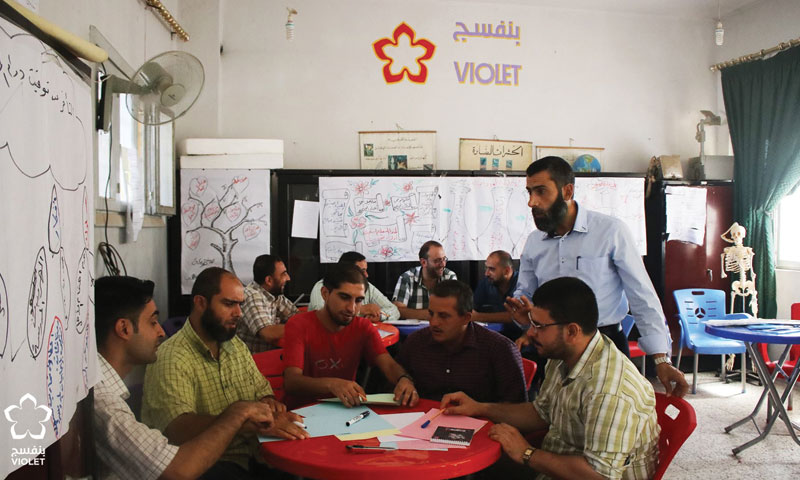The “Education Cannot Wait” project continues to offer its services in Idlib governorate, as to support the schools destroyed due to the Syrian conflict, backed by the UN Children’s Fund (UNICEF) and the “Save the Children” organization, while implemented by local organizations.
Among the organizations participating in the implementation of the project, launched in June 2017, there are “Violet” organization and “Takaful Alsham” (Collaboration of al-Sham) Charity. The first applies the project’s plan to 15 schools at the cities of Idlib, Harem, Binnish and Armanaz, while the second applies it to 15 schools at the cities and towns of al-Dana, Saraqib, Atarib and Maarrat Misrin.
In an interview with Enab Baladi, the Director of the Education Program at the “Violet” organization Mohammad Ameer Sayed Issa said that the two organizations have conducted an evolution as to define the basic needs of the educational sector in June 2017. The evaluation process covered 68 schools at the governorate of Idlib, through which schools most in need of support are chosen.
Full and Partial Support
The “Education Cannot Wait” project is a part of an international program, supported by the two organizations of “UNICEF” and the “Save the Children.” The funding is provided into two form, full and parietal funding, according to the need and the degree of damage of each school.
The Director of the Education Program at the “Violet” organization estimated that about eight schools require a full funding, one that covers a number of the schools’ activities, on top of which are: supporting both the formal and the informal education, teaching life and citizenship skills to children, offering social and psychological support and paying the schools’ active teachers’ salaries for 18 months, as well as organizing campaigns to encourage students to return to school, distribution of school bags, offering the teachers educational tools and a three-stage practical training.
According to the evaluation process, the number of schools in need for partial support is 22 schools, as it covers the following activities: organizing campaigns to encourage students to return to schools, distributing bags to teachers and students, offering educational tools to the teachers, and a three-stage practical training throughout the project’s duration.
The direct number of the people that will benefit from the “Education Cannot Wait” project is about 15422, including students, teachers and employees, 55% of them is female and 45% is male beneficiaries, according to Sayed Issa.
He added that the project focuses on achieving certain benefits for the children displaced to Idlib, in addition to the area’s children, whose age varies between 5 and 18 years old.
The project is decided to go on offering its services to the end of April 2019.
Losses of the Educational Sector
In the areas controlled by the Syrian regime, the school year of 2018-2019 started on Sunday, September 2, while it started on Saturday, September 1, in the opposition held areas, despite the fact that many schools are rendered out of service in Northern Syria.
Throughout seven years of conflict, the Syrian educational sector suffered massive losses, due to which more than two million children dropped out of school, according to the UN Children’s Fun (UNICIF) as stated by the report it published on April 23, 2018.
The organization attributed the Syrian children’s dropping out from schools to the damage that befell 309 education utilities as a result of armed conflict, for one out of three schools is rendered out of service since 2011, either for being a target to shelling or for turning into a make shift center for displaced people.
The areas held by the Syrian opposition witnessed several school rehabilitation projects under the supervision of local councils there, the last of which was conducted in April, when the “United Engineers Organization” launched an engineering project aiming at the rehabilitation of Idlib governorate’s schools.
Other organizations acted as to rehabilitate partially damaged schools, prior to the launch of the current school year, covering the cleaning of the schools that are yet in service, removal of dirt and wreckage of schoolyards, restoration process, and refilling the water tanks.

